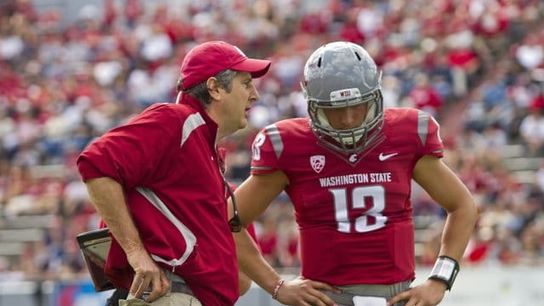Mike Leach appeared on "Culotta and the Prince" on ESPN Baton Rouge Friday morning (full audio available below) and, by Leach standards, it was a pretty straightforward interview. Common rabbit trails such as Geronimo, dating, the weather, economic expansion in Micronesia and the like were ignored in favor of Leach's primary area of expertise: quarterbacks.
The hosts asked Leach, he of countless hours of watching tape and scores of quarterbacks evaluated over his now 28-year career, what is the first thing he looks for in a signal caller.
"I think it's really pretty easy," Leach said. "The first thing is, is he accurate? You can help him become a little more accurate but I can't say that I've ever taken anybody from flat-out inaccurate to make him accurate. I don't know that anybody else ever has, either. I know there's a ton out there that think they can. I'd be interested in talking to somebody that thinks they have or seen it, because I haven't seen it very much. And I'm not one of those guys that is really into, he's either got it or he's not, because that diminishes the role of a coach. It seems to me somewhere in the backyard around sixth grade a guy's accurate or not. He might belong at quarterback or he might not. Some guys just throw more accurately, and there are enough accurate guys out there I think I'd start out with an accurate one. In other words, once he decides what to throw the ball at, can he hit it? And then, does he make good decisions? A lot of that's coached. You can control that as a coach and you can enhance that as a coach. That's probably one of the areas of quarterback play you have the most impact on."
Leach said he uses that philosophy when evaluating tape of high school prospects.
"As I watch a high school kid's film I try to see if he's decisively going somewhere with his eyes and throws the ball on time, because you're not sure exactly what he's being coached there so you try to see if he has a nice, crisp operation, has clear priorities in his head where he's going to go with the football," he said.
Leach and his former boss Hal Mumme popularized the spread offenses that are now ubiquitous in college and high school football, but to this day Leach has never added the third dimension that many of his imitators did - a quarterback that can take off and run. Leach said that's because he looks for quick-footed quarterbacks over ones that possess straight-line speed.
"The other qualities are, does a guy have quick feet?" Leach said. "There's a difference between quick feet and fast. Does a guy have quick feet, does he have a strong arm and is he fast? Well, if you go to the NFL Hall of Fame none of them have all those five things but any of them that are any good have the first two, which is is he accurate and does he make good decisions."
The hosts then asked where arm strength fit into Leach's evaluations. Keep this in mind as the NFL Draft dominates the national discussion over the next week.
"Nice to have. Not important...It's among the least important qualities I look for in a quarterback, but it's good to have just like being fast is good to have," he said. "I do think no matter who you have you have to have a guy who can throw it crisply 50 yards because there's a point where you can only protect so long. We figure we can justifiably protect 3-3.5 seconds and I don't have any skill players, never coached one, that can run an 80-yard dash in 3.5 seconds. And then you look at vertical routes, fade routes you're throwing on time, those things are 28-t0-35 yards downfield, which then you have to add how far it is to the sideline it's probably 40, 45 yards. There's a point to where it's only relevant on broken plays or emergencies. So it's good to have in emergencies."
Leach then explained, in typical Leach fashion, the one time it would pay to have a cannon-armed quarterback.
"Your quarterback holds the ball, or say he's dumb, you'd rather not have a dumb quarterback and he holds the ball and it takes him a long time to sort it out, and finally there's some guy 55 yards downfield and your offensive line manages to protect that long, it's nice to know that he can hit him," he said, "but your bigger problem is that he was dumb enough to hold it that long."
